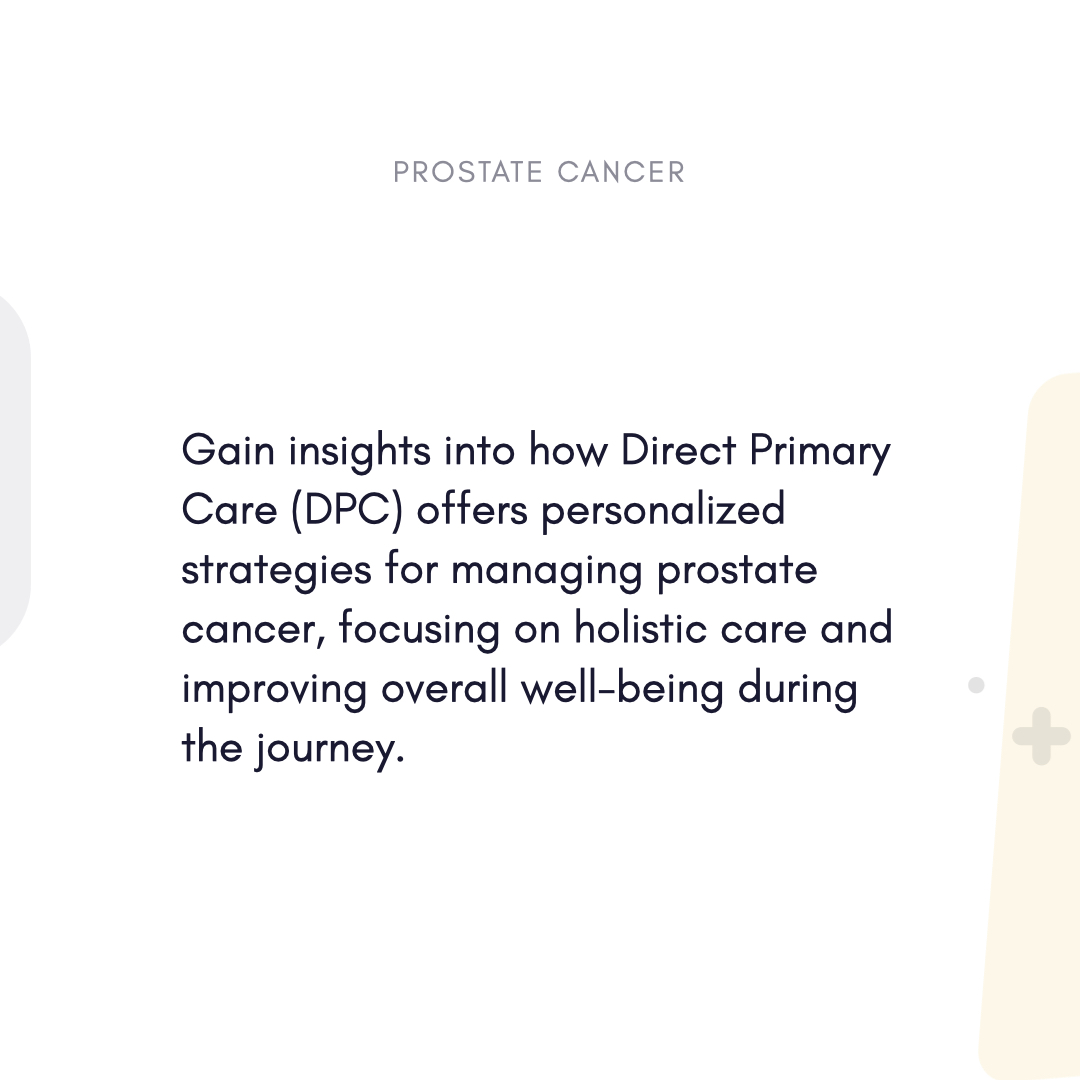Prostate Cancer and Direct Primary Care (DPC): Personalized Care for Better Outcomes
An increasing PSA level that keeps you awake late at night. The tension of deciding between radiation and surgery. For one in eight men found to have prostate cancer, this road is full of difficult choices and residual side effects. Although conventional treatment sometimes runs through choices, there is hope since direct primary care (DPC) offers a patient-centered partnership to negotiate treatment and recover quality of life.

Gaining Knowledge About Prostate Cancer
Second most common cancer in men, prostate cancer ranges from slow-growing (Gleason 6) to aggressive (Gleason 9–10). Principal factors:
- Debates about PSA screening: Managing overdiagnosis against early discovery
- Treatments available: Active surveillance; surgery; radiation; hormone treatment
- Problems of survivability: Incontinence, dyspnea, bone strength, sexual performance
The American Urological Association (AUA) stresses shared decision-making catered to cancer risk and patient values.
DPC's Transformational Effect Care for Prostate Cancer
Operating on a membership model usually between 100 USD and 300 USD per month, Direct Primary Care (DPC) provides unlimited access to your doctor for a set fee. This means no co-pays, no prior authorization delays, and a care plan as exact as your Gleason score for those suffering with prostate cancer.
1. Early Detection and Screening for Diseases
The transparent approach of DPC guarantees:
- PSA vigilance: yearly tests including quick follow-up for spikes.
- Digital rectal exams (DREs) performed in-house during regular visits.
- MRI fusion biopsies: Coordinating cash-pay discounts for accuracy in diagnosis.
2. Individualized, Guideline- Driven Treatment
DPC doctors design custom plans compliant with AUA/NCCN recommendations:
- Active surveillance: Monthly PSAs, yearly MRIs for low-risk events.
- Treatment navigation: Side effects of robotic surgery against proton therapy.
- Managing hormones: reducing osteoporosis risks and hot flash frequency.
3. Complete, Economical Assistance
DPC lowers physical and financial burden by:
- Medication costs: Wholesale pricing for enzalutamide or abiraterone.
- 24/7 telehealth access to control post-operative pain or urinary retention.
- Programs for survivorship including mental health support, ED treatments, and pelvic floor therapy.
Advantages of DPC for Prostate Cancer Patients
1. Unmatched Attractiveness
- Same-day PSA anxiety or new symptom consultations.
- Not one referral delays top urologists or radiation oncologists.
2. Customized Interventions
- Genomic testing: Use Decipher or Oncotype DX to direct treatment intensity.
- Program for prehabilitation: before surgery Kegels and dietary changes help speed healing.
3. Open Cost Transparency
- Included are consultations, basic labs, and care coordination under membership.
- Typical savings: 5,000 USD+ yearly from drug mark-ups and facility fees avoided.
Personal Success Stories from Real Life
- Case 1: John, 65, decided on DPC's active surveillance. Avoiding needless surgery, his doctor prescribed quarterly PSAs and MRI-guided biopsies.
- Case 2: Working with his DPC team, Mike, 58, with high-risk cancer negotiated proton treatment and hormone injections. He still has sexual ability after treatment.
Questions of Frequency: DPC and prostate cancer
- Q: Can DPC manage cases involving advanced/metastatic progression?
- A: Exactly. Often at self-pay discounts, DPC doctors coordinate chemotherapy, immunotherapy, and palliative care.
- Q: Is DPC within budget without insurance?
- A: Sure. Members save advanced imaging (200 USD vs. 1,500 USD) and Lupron injections.
- Q: Regarding second views, what is it?
- A: A DPC doctor arranges visits with elite facilities like MD Anderson or Mayo Clinic.
Why DPC Benefits Those With Prostate Cancer
Emphasizing DPC's alignment with cancer care standards, the American Society of Clinical Oncology supports:
- Precision: Based on life expectancy, adjusting surveillance against treatment.
- Empowerment: Tools for PSA trend tracking, side effect tracking, symptom tracking.
- Trust: A lifetime friend replaces disjointed, transactional treatment.
Undertake Control of Your Prostate Health
One does not have to fight prostate cancer alone. With DPC, you have a partner who walks with you from diagnosis to survivorship, listens deeply, and develops treatments—every step of the way.






